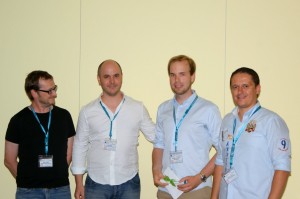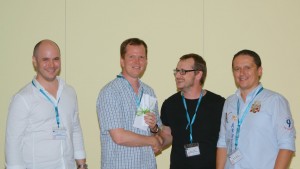This years’ best paper awards are sponsored by QUALINET and we congratulate the winners who are as follows:

Best student paper award (from left to right): Patrick Le Callet, Martin Varela, Olli Rummukainen, Christian Timmerer
Best Student Paper Award
Olli Rummukainen, Javier Gómez Bolanõs, and Ville Pulkki: Horizontal Localization of Auditory and Visual Events with Directional Audio Coding and 2D Video
Abstract: The effects of using two-dimensional video projection together with parametric three-dimensional spatial audio reproduction system are examined in this study. The discrepancy between the auditory and visual events, and differing depth cues, are evaluated by means of subjective evaluations using the method of adjustment. The results show the Directional Audio Coding to be well suited for immersive audiovisual setups allowing a large area of viewing positions.

Best paper award (from left to right): Martin Varela, Andrew Hines, Patrick Le Callet, Christian Timmerer
Best Paper Award
Andrew Hines, Peter Počta, and Hugh Melvin: Detailed Comparative Analysis of PESQ and ViSQOL Behaviour in the Context of Playout Delay Adjustments Introduced by VoIP Jitter Buffer Algorithms
Abstract: This paper undertakes a detailed comparative analysis of both PESQ and VISQOL model behaviour, when tested against speech samples modified through playout delay adjustments. The adjustments are typical (in extent and magnitude) to those introduced by VoIP jitter buffer algorithms. Furthermore, the analysis examines the impact of adjustment location as well as speaker factors on MOS scores predicted by both models and seeks to determine if both models are able to correctly predict the impact on quality perceived by the end user from earlier subjective tests. The earlier results showed speaker voice preference and potentially wideband experience dominating subjective tests more than playout delay adjustment duration or location. By design, PESQ and VISQOL do not qualify speaker voice difference reducing their correlation with the subjective tests. In addition, it was found that PESQ scores are impacted by playout delay adjustments and thus the impact of playout delay adjustments on a quality perceived by the end user is not well modelled. On the other hand, VISQOL model is better in predicting an impact of playout delay adjustments on a quality perceived by the user but there are still some discrepancies in the predicted scores. The reasons for those discrepancies are particularly analysed and discussed.

This is good post.